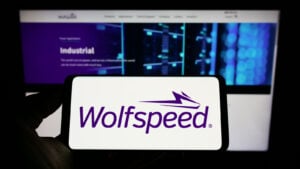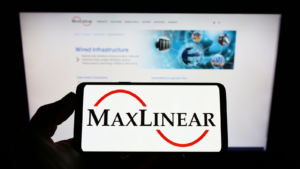7 Struggling Semiconductor Stocks to Sell in March
With the growth of artificial intelligence and machine learning, you may be tricked into thinking that all tech stocks are big winners in 2024. But you’d be wrong, particularly when considering semiconductor companies. Plenty of struggling semiconductor stocks to sell quickly before they seriously damage your investment portfolio.
The Semiconductor Industry Association says that global sales of semiconductors dropped 8.2% in 2023, to $526.8 billion. Sales were off primarily because the personal computer industry slowed down and didn’t order as many semiconductor chips. Add to that slowing consumer electronics and server sales in general, and the semiconductor industry faced some challenging times.
And while sales started to improve in the year’s second half, many semiconductor stocks have yet to regain their momentum.
We can use the Portfolio Grader to pick out several struggling semiconductor stocks today. The Portfolio Grader evaluates stocks based on earnings performance, growth, momentum, and analyst sentiment. Stocks that get bad grades are given “D” or “F” ratings.
These stocks are among the worst semiconductor stocks you can buy now.
Wolfspeed (WOLF)

Wolfspeed (NASDAQ:WOLF) is a manufacturer of next-generation semiconductors. It uses silicon carbide technologies to make semiconductors for electric vehicles, renewable energy products and other fast-charging and/or wireless applications.
But the semiconductor slowdown weighed heavily on Wolfspeed, which saw its losses grow last year. For the second quarter of fiscal 2024 (ending Dec. 31, 2023, Wolfspeed brought in $208.4 million in revenue, an improvement from $173.8 million a year ago. However, the net loss for the quarter was $144.7 million, more than the $90.9 million Wolfspeed lost in the same quarter a year ago.
Wolfspeed projects third-quarter revenue between $185 million and $215 million, with losses between $134 million and $155 million. Thus, there will be no improvement, at least in the short term.
WOLF stock is down 56% in the last year and gets an “F” rating in the Portfolio Grader.
MaxLinear (MXL)

MaxLinear (NASDAQ:MXL) makes analog, digital and mixed-signal circuits, as well as wire and wireless infrastructure.
The fourth quarter of 2023 continued MaxLinear’s downward spiral. Revenue was $125.3 million, down from $290.5 million a year ago. The company posted a loss of $38.5 million and 47 cents per share versus a profit of $31.1 million and 40 cents per share a year ago.
The company is also now in arbitration with Silicon Motion (NASDAQ:SIMO) for backing out of its proposed $4 billion acquisition. Silicon Motion is seeking $160 million as a termination fee plus other damages, interests and costs.
MXL stock is one to avoid. It’s down 45% in the last year and gets a “D” rating in the Portfolio Grader.
Amkor Technology (AMKR)
Amkor Technology (NASDAQ:AMKR) doesn’t make semiconductors but is a semiconductor stock because it relies directly on the product. And that’s why it’s hurting this year.
Amkor packages and tests integrated circuits for semiconductor chip manufacturers. The completed chips are used in smartphones, tablets, electric vehicles and consumer electronics.
But since those businesses haven’t made as many semiconductors lately, Amkor hasn’t been packaging and testing as many. Revenue in the fourth quarter was $1.7 billion, down from $1.8 billion a year ago. Amkor made $6.5 billion in revenue for the full year, down from $7.1 billion in 2022.
Amkor stock shows some life; the stock is up 30% in the last 12 months although it’s slipped 6% since January 1. It’s still not a good bet, though, and gets a “D” rating in the Portfolio Grader.
Alpha and Omega Semiconductor (AOSL)
Alpha and Omega Semiconductor (NASDAQ:AOSL) makes semiconductors used in products such as flat-panel televisions, LED lighting, smartphones, battery packs, computer equipment and telecommunications equipment.
The company recently received some good news when it announced that the Department of Justice closed a criminal investigation concerning business transactions the company had with Chinese hardware company Huawei Technologies and brought no charges.
The probe began in 2019 after the Department of Commerce ordered Alpha and Omega to suspend shipments of products to Huawei. The Justice Department’s probe involved Alpha and Omega’s compliance with export control regulations, but the Commerce Department’s civil investigation continues.
When you add the Huawei issue to an already challenging environment for semiconductor stocks, you can see why AOSL is a troubled stock.
Revenue in the second quarter of fiscal 2024 (ending Dec. 31, 2023) was $165.3 million, down from $188.8 million a year ago. The company posted a loss of $2.9 million and 10 cents per share, a year after posting a profit of $6.3 million and a gain of 21 cents per share.
AOSL stock is down 12% in the last year and gets a “D” rating in the Portfolio Grader.
SkyWater Technology (SKYT)
SkyWater Technology (NASDAQ:SKYT) is a Minnesota semiconductor engineering and fabrication company. Its products are used for aerospace and defense products, consumer, automotive, industrial and healthcare applications.
SkyWater is the only U.S.-owned pure play silicon foundry. That may give it an advantage for companies that want to use American manufacturers.
But that really doesn’t help when the entire semiconductor industry is seeing a slowdown no matter where your plant may be located.
Revenue in the fourth quarter was $13.8 million, down 19% from a year ago. The company posted a net loss of $1.1 million and 2 cents per share, versus a loss of $1.5 million and 3 cents per share a year ago.
SKYT stock is down 8% in the last year. It gets a “D” rating in the Portfolio Grader.
Shoals Technology (SHLS)

Shoals Technology (NASDAQ:SHLS) is in the solar energy business. The company provides electrical balance of systems (EBOS) solutions for the infrastructure of solar, storage, and electric vehicle charging.
It works with solar factories around the world and helps produce 62 gigawatts of solar power. A few years ago, Shoals and other solar companies would have been considered good investments.
But not today. Labor costs, regulatory changes and higher interest rates crippled the industry last year. Solar isn’t the hot commodity it used to be, and that’s reflected in Shoals’ performance.
Revenue in the fourth quarter was actually up — $130.4 million versus $94.6 million a year ago. But net income was only $16.5 million, for earnings per share of 10 cents. For the full year, earnings were only 24 cents per share.
SHLS stock is down 41% in the last 12 months; it has a long way to go to regain its former glory. It get an “F” rating in the Portfolio Grader.
Skyworks Solutions (SWKS)
Skyworks Solutions (NASDAQ:SWKS) is a California-based semiconductor manufacturer that operates amplifiers, audio devices, clocks, modems, switches, televisions and more.
The company’s products can be used in smartphones, data centers, automobiles, and healthcare devices.
The company depends heavily on Apple (NASDAQ:AAPL), which provides components for its desktop computers, notebooks, smartphones, watches, and tablets. While this has been a good source of revenue, it also makes Skyworks vulnerable should Apple turn to another supplier or start making its own parts.
Apple has also struggled recently with iPhone sales, particularly in China. Lowered demand for Apple’s products eats directly into Skyworks’ bottom line.
Earnings for the first quarter of fiscal 2024 included revenue of $1.2 billion, down from $1.32 billion a year ago. Income of $231.3 million was a drop from $309.4 million in the same quarter a year ago.
SWKS stock is down 8% in the last year. It gets a “D” rating in the Portfolio Grader.
On the date of publication, Louis Navellier had a long position in AMKR. Louis Navellier did not have (either directly or indirectly) any other positions in the securities mentioned in this article.
The InvestorPlace Research Staff member primarily responsible for this article had a long position in AAPL. The staff member did not hold (either directly or indirectly) any other positions in the securities mentioned in this article.

